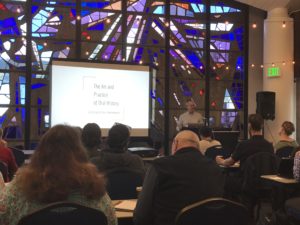by Martin Meeker
Since 2002, the Oral History Center has hosted a week-long advanced institute on oral history theory and methodology every August. We’ve welcomed over 500 people from across the country and around the globe, with another 30 about to join us this year. As my colleagues and I prepare for this year’s program, I wanted to reflect on where we’ve been and where we’d like to take this most worthwhile endeavor.
The first institute in which I participated was the second, in 2003. I had recently come to what was then known as the Regional Oral History Office, or ROHO, as a postdoc working with then-director Richard Candida-Smith. That first year (and, frankly, several that followed) are now nothing more than a blur: the experience was definitely one of those “drinking from a firehose” situations. Although I was soon to join ROHO as an interviewer, I now look back and see myself as a real oral history novice. I had read the requisite articles (Portelli!) and conducted a number of interviews, but my experiences were relatively few and not very diverse. The Summer Institute opened my eyes to many aspects of the interview that I had never really considered in any depth. I remember one session taught by guest faculty Jeff Friedman about movement and the performative aspects of oral history. Not that I needed any encouragement to feel more self-conscious in an interview setting, but this got me thinking more about the complexities of self-presentation, body language, and the dreaded yawn that sometimes escapes the mouth of an interviewer.
Subsequent years saw a number of interesting guest faculty appearances along with a revolving roster of OHC interviewers, but for the first dozen institute, the stalwart was Lisa Rubens, who curated and ran the institute. Lisa and I recently met for coffee and we discussed how the institute has changed in interesting and productive ways over the years, but one thing has been true since the beginning: the week is always invigorating (if exhausting) and one can always expect a slightly euphoric afterglow. With so many new relationships forged, so many opportunities to learn and share knowledge, the experience always is worth it.
On August 6th we’ll welcome our next group of summer institute participants. Shanna Farrell, who has led the institute since 2014, has planned what promises to be yet another always fascinating, and sometimes challenging, week of presentations, roundtables, and workshops. I’ll be presenting a updated version of my legal and ethics talk, which is inspired in part by my recent work on the committee revising the Oral History Associations documents on ethics and best practices. We are hosting another Tuesday evening presentation, free and open to the public. This year Erin Riggs will discuss the 1947 Partition Archive, which documents the troubled split of India and Pakistan. In addition to this, I’m especially looking forward to a panel on the final day of the event created by our two newest interviewers at OHC, Amanda Tewes and Roger Eardley-Pryor. They’ll not only discuss the performative aspects of oral history, they’ll…well, I don’t want to give away the surprise, do I?
Every year after the conclusion the institute, the faculty read very carefully the feedback provided by participants, and we take what they have to say seriously, often incorporating participant ideas into next year’s program. So, this institute has become a continuous learning experience for all of at OHC, which is what we hope it is for the participants too.
Martin Meeker
Charles B. Faulhaber Director
July 27, 2018
